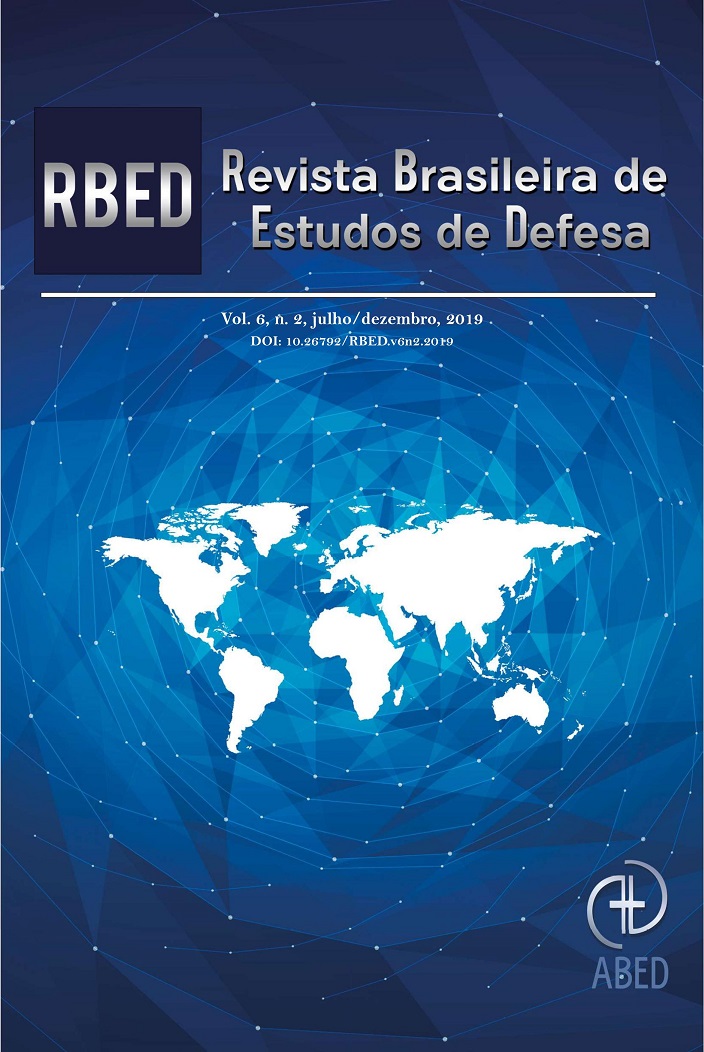Relações EUA-África: os 10 anos de estabelecimento do Africom (2007-2018)
DOI:
https://doi.org/10.26792/rbed.v6n2.2019.75169Palavras-chave:
África, AFRICOM, Estados Unidos, SegurançaResumo
Os Estados Unidos criaram o Africom em 2007, modificando sua atuação na África. Utilizando a perspectiva do realismo estrutural, o objetivo do artigo é identificar os objetivos dos Estados Unidos com o Africom, e analisar as ações do Comando até 2018. Entende-se que as metas de Washington foram parcialmente atingidas.
Downloads
Referências
BAH, A Sarjoh; ANING, Kwesi. 2008. US Peace Operations Policy in Africa: From ACRI to AFRICOM. International Peacekeeping, v.15, n.1. https://doi.org/10.1080/13533310701879969
BRZEZINSKI, Zbgniew. 1997. The Grand Chessboard. New York: Basic Books.
BUSH, George H. W. 1991. Address Before a Joint Session of the Congress on the State of the Union. Washington. Disponível em: http://www.presidency.ucsb.edu/ws/?pid=19253. Último Acesso em 30/10/2016.
DUNN, Kevin. 2008. “Sub-Saharan Africa.” In: From Superpower to Besieged Global Power: Restoring World Order after the Failure of the Bush Doctrine, edited by Edward A. Kolodziev and Roger E. Kanet. Athens: The University of Georgia Press.
FOREST, James J. F.; CRISPIN, Rebeca. 2009. AFRICOM: Troubled Infance, Promissing Future. Contemporary Security Policy, v.30, n.1. https:// doi.org/ 10.1080/13523260902759753
JAMIESON, Capitan (SAN) D. G. 2009. AFRICOM: a threat or an opportunity for African security? South African Journal of International Affairs, v.16, n. 3. https://doi.org/10.1080/10220460903495215.
JOHNSON, Chalmers. 2007. As Aflições do Império: Militarismo, Operações Secretas e o Fim da República. Sao Paulo: Editora Record.
MEARSHEIMER, John J. 2001. The Tragedy of Great Power Politics. New York: W. W. Norton & Company.
MENDONÇA, Hélio Magalhães de. “South African Foreign Policy 1945-1999”. In: GUIMARÃES, Samuel Pinheiro (ed.) Brazilian views on South African foreign policy. Brasília: FUNAG, 2000, p. 11-90.
NATIONAL SECURITY STRATEGY 2002. 2002. United Sates: Washington.
NATIONAL SECURITY STRATEGY 2015. 2015. United Sates: Washington.
PHAM, Peter J. 2014. The Development of the United States Africa Command and its Role in America’s Africa Policy under George W. Bush and Barack Obama. Journal of the Middle East and Africa, v.5, n.3. https://doi.org/10.1080/21520844.2014.980192
PLOCH, Lauren. 2011. Africa Command: U.S Strategic Interests and the Role of the U.S. Military in Africa. Congressional Research Service Report for Congress.
SCHRAEDER, Peter J. 2013. “African International Relations.” In: Understanding Contemporary Africa, edited by April A. Gordon and Donald L. Gordon. London: Lynne Rienner Publishers, 2013.
TELLA, Oluwaseun. 2016. AFRICOM: hard or soft power initiative?. African Security Review, v. 25, n.4, 2016. https://doi.org/ 10.1080/10246029.2016.1225588
UNITED STATES AFRICAN COMMAND (USAFRICOM). 2018. United States African Command: The First Ten Years. Stuttgart, Headquarters United States African Command.
___. 2019. Statement of General Thomas D. Waldhauser, United States Marine Corps Commander United States Africa Command before the Senate Committee on Armed Services. VISENTINI, Paulo G. Fagundes. 2010. A África Moderna: um continente em mudança (1960-2010). Porto Alegre: Leitura XXI.
WALTZ, Kenneth N. 2002. Teoria das Relações Internacionais. Lisboa: Gradiva.
WHELAN, Theresa. 2017. Why AFRICOM? An American Perspective. Institute for Security Studies, Situation Report.
Downloads
Publicado
Como Citar
Edição
Seção
Licença
Autores que publicam nesta revista concordam com os seguintes termos:1) Autores mantêm os direitos autorais e concedem à revista o direito de primeira publicação, com o trabalho simultaneamente licenciado sob a Licença Creative Commons Attribution que permite o compartilhamento do trabalho com reconhecimento da autoria e publicação inicial nesta revista.
2) Autores têm autorização para assumir contratos adicionais separadamente, para distribuição não-exclusiva da versão do trabalho publicada nesta revista (ex.: publicar em repositório institucional ou como capítulo de livro), com reconhecimento de autoria e publicação inicial nesta revista.
3) Autores têm permissão e são estimulados a publicar e distribuir seu trabalho online (ex.: em repositórios institucionais ou na sua página pessoal) a qualquer ponto antes ou durante o processo editorial, já que isso pode gerar alterações produtivas, bem como aumentar o impacto e a citação do trabalho publicado (Veja O Efeito do Acesso Livre).





